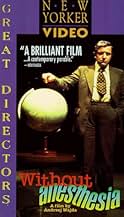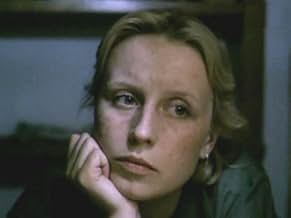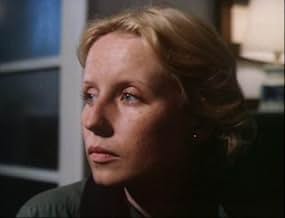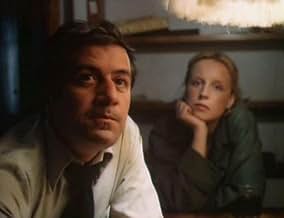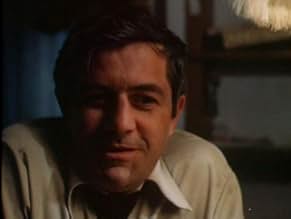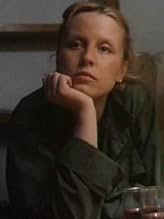Un journaliste assistera, impuissant, à l'effondrement du monde qu'il s'est forgé en s'autorisant des libertés dans son travail. Une parabole politique réalisée à l'époque où les vents éphém... Tout lireUn journaliste assistera, impuissant, à l'effondrement du monde qu'il s'est forgé en s'autorisant des libertés dans son travail. Une parabole politique réalisée à l'époque où les vents éphémères du changement soufflaient en Pologne.Un journaliste assistera, impuissant, à l'effondrement du monde qu'il s'est forgé en s'autorisant des libertés dans son travail. Une parabole politique réalisée à l'époque où les vents éphémères du changement soufflaient en Pologne.
- Réalisation
- Scénario
- Casting principal
- Récompenses
- 2 victoires et 3 nominations au total
Marta Salinger
- Gabcia
- (as Maria Salinger)
Danuta Balicka
- Judge
- (as Danuta Balicka-Satanowska)
Avis à la une
When I was growing up in Poland Wajda was always the most boring director for me, still remember when he made "Pan Tadeusz" my whole school went to cinema to see it, and it was so boring for all of us. Then I grow up a little, and found that my new favorite directors are Kubrick, Tarkovsky, Wells and then they give Wajda a honorary Oscar for five decades of extraordinary film direction in 2000, and I started to wonder, why, then i watch "Kanal", "Popiol i diament", "Czlowiek z marmuru" and i knew it why because he is powerful director. There were few weaker movies like "Pokolenie" or "Lotna" but majority of his movies are grand and timeless. I think "Bez znieczulenia" is one of the best movie by Wajda. Its story about man who got everything fame, family, respect and love and in just one second his wife want divorce, and at work there is waiting for a man slow degradation. Its story showing communism in Poland from the worst side a place where dabblers are winners, where when the suck starts it ends at Kafka notes. I was shocked how up to date the story is even now in democratic Poland. The screenplay is great co-written with Agnieszka Holland i bet it shows a lot of real life situation, because the power on screen match perfectly the one scene when the lead character has his teeth pulled "sin anestesia", and the whole movie is a much powerful, and painful as this one scene. There is great acting especially by Zbigniew Zapasiewicz, but whole cast is just perfect from Seweryn and Dalkowska to the small creepy parts of Stuhr, Kaczor or Wilhelmi. Sadly this powerful movie is forgotten in Poland, but for me its the most important Polish movie, and so up-to-date that its almost scary. Must-See.
First, I admit that I've admired almost everything that Andrzej Wajda has done, since I had the pleasure of seeing a National Gallery of Art retrospective of his films in Washington (that he attended). This movie was not in that series, but it should have been.
On one level it is a simple story of a man's life falling apart--both his professional life and his personal life.
Jerzy Michalowski is an urbane and confident foreign affairs reporter who has been all over the world and is not afraid to "modestly" describe his many travels and insights about world (and implicitly Polish) affairs on national TV.
He seems to have it all, yet upon his return, the "authorities" (including of course his pliant immediate superiors), begin to try to cut him down to size. His privileges begin to evaporate. He no longer receives foreign magazines ("Where is my Newsweek?"), his next trip is no longer necessary, his course at the university is mysteriously cancelled, his defender at the office loses his position. The vice starts to tighten.
Meanwhile his wife has also at the same time decided to leave him for a younger colleague who is immensely dismissive (but jealous) of Jerzy. This part of the plot suffers a bit since the colleague is such a priggish jerk, and it is hard to see what the wife sees in him. But perhaps this is Wajda's way of putting us, the viewer, in Jerzy's shoes--he can't believe this could happen either. Moreover Jerzy is fundamentally a sympathetic character--he dotes on his daughter, his dog, his students, and is good to his friends.
But the double whammy he is hit with sends him reeling and he flails in all directions trying to "fix" things. Along the way he lets his students party in his apartment, and he allows a doting but silent woman (the luminous Krstyna Janda--star of "Man of Iron" and "Man of Marble") to stay with him (platonically) in his apartment. And even though his wife is having some second thoughts, she goes through with the divorce action. This sets up the divorce proceeding in court. The courtroom scenes are classic communist jurisprudence--a patina of fairness over a lot of half truths and quarter truths.
In the end his world has completely fallen apart.
This is a 1979 film and Wajda, of course, had to be somewhat careful.
He uses a "soap opera" story to camouflage a trenchant critique of the then-existing Polish "system"--one that hammers down the rare nail that sticks out and that makes it possible for courtroom "witnesses" to transparently lie on the witness stand without challenge by bored and mechanical judges.
The acting is excellent and very natural--(except for the jealous colleague), and the overall effect is haunting.
But see anything with Wajda's name on it.
On one level it is a simple story of a man's life falling apart--both his professional life and his personal life.
Jerzy Michalowski is an urbane and confident foreign affairs reporter who has been all over the world and is not afraid to "modestly" describe his many travels and insights about world (and implicitly Polish) affairs on national TV.
He seems to have it all, yet upon his return, the "authorities" (including of course his pliant immediate superiors), begin to try to cut him down to size. His privileges begin to evaporate. He no longer receives foreign magazines ("Where is my Newsweek?"), his next trip is no longer necessary, his course at the university is mysteriously cancelled, his defender at the office loses his position. The vice starts to tighten.
Meanwhile his wife has also at the same time decided to leave him for a younger colleague who is immensely dismissive (but jealous) of Jerzy. This part of the plot suffers a bit since the colleague is such a priggish jerk, and it is hard to see what the wife sees in him. But perhaps this is Wajda's way of putting us, the viewer, in Jerzy's shoes--he can't believe this could happen either. Moreover Jerzy is fundamentally a sympathetic character--he dotes on his daughter, his dog, his students, and is good to his friends.
But the double whammy he is hit with sends him reeling and he flails in all directions trying to "fix" things. Along the way he lets his students party in his apartment, and he allows a doting but silent woman (the luminous Krstyna Janda--star of "Man of Iron" and "Man of Marble") to stay with him (platonically) in his apartment. And even though his wife is having some second thoughts, she goes through with the divorce action. This sets up the divorce proceeding in court. The courtroom scenes are classic communist jurisprudence--a patina of fairness over a lot of half truths and quarter truths.
In the end his world has completely fallen apart.
This is a 1979 film and Wajda, of course, had to be somewhat careful.
He uses a "soap opera" story to camouflage a trenchant critique of the then-existing Polish "system"--one that hammers down the rare nail that sticks out and that makes it possible for courtroom "witnesses" to transparently lie on the witness stand without challenge by bored and mechanical judges.
The acting is excellent and very natural--(except for the jealous colleague), and the overall effect is haunting.
But see anything with Wajda's name on it.
Le saviez-vous
- AnecdotesFilm debut of Tomasz Stockinger.
Meilleurs choix
Connectez-vous pour évaluer et suivre la liste de favoris afin de recevoir des recommandations personnalisées
Détails
- Durée2 heures 11 minutes
- Mixage
- Rapport de forme
- 1.37 : 1
Contribuer à cette page
Suggérer une modification ou ajouter du contenu manquant



